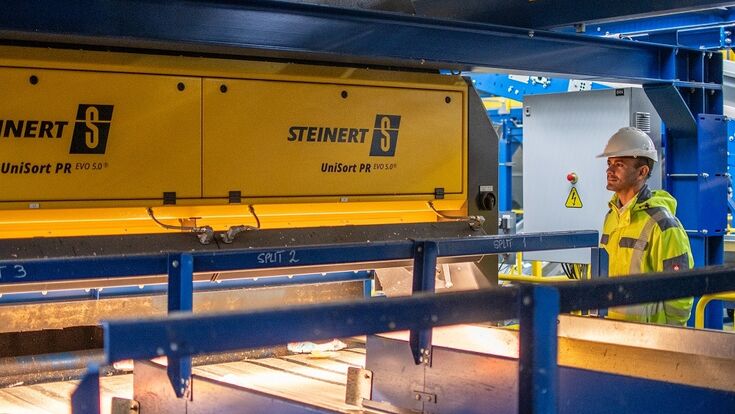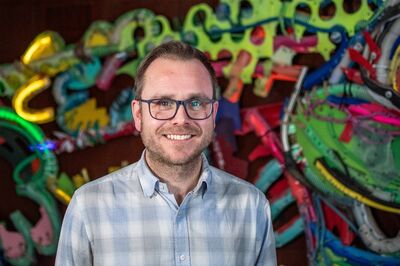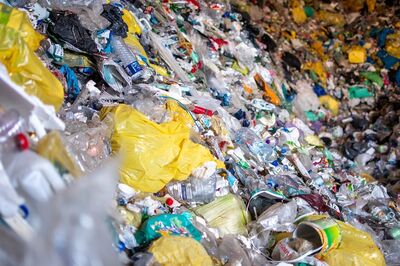Recycling : Innovating with responsibility - LIPOR's new waste sorting plant

Uni Sort PR EVO 5 0 is ideal for sorting using artificial intelligence based sorting programmes.
- © SteinertLIPOR is not just another company. Founded in 1982, it is responsible for the waste management of eight municipalities in the Greater Porto area, a region with more than a million inhabitants. LIPOR processes around 500,000 tonnes of waste a year with a clear objective - to recycle as much as possible and protect the environment. As well as recycling waste, the company uses extensive education and information programmes to raise public awareness of environmental issues.
The old days at the "LIPOR 1" plant are a thing of the past - and for good reason. Since 2019, LIPOR has been working to modernise its sorting facilities - an ambitious project aimed at increasing capacity and digitising the entire process. "We always wanted to bring this technology here," says Helder Filipe, head of operations and logistics, who is responsible for the development of the site. The decision to go with STEINERT's state-of-the-art solutions was the result of extensive research and testing. "We met at a trade fair and immediately arranged a test date to see how the machines would sort our materials," continues Filipe.
The plant is now equipped with seven UniSort near infrared (NIR) sorting systems, two STEINERT UME suspension magnets and a STEINERT CanMaster eddy current separator. This technology upgrade has revolutionised the company's operations. Instead of manually sorting 12,000 to 13,000 tonnes of waste per year, the plant now processes it two to three times faster at 8 tonnes per hour - with a significantly reduced staff of 12 to 14. "In general, they no longer have to sort the waste themselves, but only carry out quality checks or maintenance work," says Filipe during a tour of the plant.

Switching to automated processes
However, the switch to automated processes was not without its challenges. "Of course, there was resistance at the beginning and questions about possible job losses," admits Filipe. However, LIPOR found a solution as employees were retrained and many were able to take on other roles within the company. For Filipe and his colleagues, this means one thing above all else - security. "We are still able to work in this area, but with machines doing most of the work," he explains. A tour of the factory makes it clear that this is about more than efficiency. This is a showcase project that demonstrates how technology and sustainability can go hand in hand.
Improved waste separation
Another benefit of the new facility is improved segregation. In Portugal, 20 to 25 per cent of the materials placed in recycling bins are still not recyclable or are contaminated. Thanks to the new sorting systems, LIPOR is able to make better use of these materials, resulting in a significant reduction in the amount of waste in a number of sorting fractions, such as PET, PP and PE in 3D and 2D, as well as TetraPak, cans, iron and paper.
This is due in part to the use of STEINERT's UniSort PR EVO 5.0 and UniSort Film EVO 5.0 NIR sorting systems, which use a combination of sensors, including a high-resolution colour camera and a hyperspectral imaging (HSI) sensor, to distinguish between a wide range of materials based on their chemical composition and colour. These systems are also ideal for sorting thanks to artificial intelligence-based sorting programmes. UniSort Film also offers air technology specifically designed for sorting 2D materials such as film and paper. This technology is able to separate materials that tend to fly around with extremely high levels of purity despite high belt speeds. State-of-the-art magnetic separation technology also plays a role in metal separation, with the STEINERT UME suspension magnet removing all ferrous metals and the STEINERT CanMaster optimised for separating non-ferrous metals such as aluminium cans.

The facility is also able to flexibly adapt the machines to new requirements and material characteristics. New packaging formats and materials are constantly appearing on the market, so this adaptability is essential to ensure the efficiency and quality of the sorting systems. The separation of thermoformed PET, which has been a legal requirement since the beginning of the year, is a particular challenge.
Nevertheless, Filipe remains optimistic: “We are continuously collaborating with STEINERT to improve our situation,” he states. “AI and data analysis will play a big role in this. When it comes to our investment in this facility, we can’t afford for the material to call the shots – we have got to be in the driving seat. To ensure that we are less dependent, we have to be able to detect and understand the material so that we can modify the process.” This strategic focus shows how LIPOR is not only addressing environmental challenges, but also economic challenges by using innovative technologies and is therefore playing an active role in shaping the future of waste management.
Continuing on the road to modernisation
Looking to the future, one thing is clear: "We still have a long road ahead of us, but there is no doubt this is where the future lies,” says Filipe looking at the facility. The modernisation of the sorting facilities with technology from STEINERT is an impressive example of how companies can assume both environmental and social responsibility through the use of innovative technology, and represents a model for change in waste management whose significance extends far beyond Portugal. From the outset, change has been a key concern for the entire company and a firm decision has been made to continue down this path of modernisation. The project is growing and improving on a daily basis. The aim is for the facilities to achieve the highest possible levels of productivity and capacity, thereby laying the foundations for sustainable waste management in the long term.
It is a project of which Filipe and his colleagues are justifiably proud.

